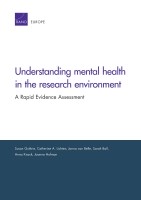| 来源类型 | Research Reports
|
| 规范类型 | 报告
|
| DOI | https://doi.org/10.7249/RR2022
|
| 来源ID | RR-2022-RS
|
| Understanding mental health in the research environment: A Rapid Evidence Assessment |
| Susan Guthrie; Catherine A. Lichten; Janna van Belle; Sarah Ball; Anna Knack; Joanna Hofman
|
| 发表日期 | 2017
|
| 出版年 | 2017
|
| 页码 | 94
|
| 语种 | 英语
|
| 结论 |
The evidence base- The majority of the identified literature on prevalence relates to wellbeing and work-related stress (rather than clinically defined mental health conditions) among academic staff and postgraduate students in university settings. There is little evidence on researchers in other settings, such as industry.
Prevalence- Survey data indicate that the majority of university staff find their job stressful. Levels of burnout appear higher among university staff than in general working populations and are comparable to 'high-risk' groups such as healthcare workers.
- The proportions of both university staff and postgraduate students with a risk of having or developing a mental health problem, based on self-reported evidence, were generally higher than for other working populations.
- Large proportions (>40 per cent) of postgraduate students report symptoms of depression, emotion or stress-related problems, or high levels of stress.
Environmental factors- In large-scale surveys, UK higher education staff have reported worse wellbeing than staff in other types of employment (including education, and health and social work) in the areas of work demands, change management, support provided by managers and clarity about one's role.
- The only area where higher education staff have reported higher wellbeing in large-scale surveys is in job control, though even here results are mixed across studies.
- PhD students face similar challenges to other researchers and higher education staff.
Interventions- Evidence around the effectiveness of interventions to support the mental health of researchers is thin. Few interventions are described in the literature and even fewer of those have been evaluated.
|
| 摘要 |
Based on the evidence gaps identified and the information available, we suggest the following avenues for further research on this topic:
- Study the prevalence of mental health conditions amongst postdoctoral researchers, building on approaches used in recent studies of postgraduate students.
- Map mental health policies and procedures at UK Higher Education Institutions to improve understanding of mental health policies and procedures in UK research institutions.
- Conduct more and higher-quality evaluations of mental health interventions and publish their results to identify what works in this area. In particular, further follow-up could be done to evaluate the interventions introduced through the wellbeing and engagement initiative established by the Higher Education Funding Council for England and subsequently maintained as a network by the Universities and Colleges Employers Association.
- Investigate and develop existing standards, such as the Health and Safety Executive management standards, as a framework for workplace mental health management in research environments to identify mechanisms at play in those settings.
|
| 主题 | Depression
; Scientific Professions
; Workforce Management
; Workplace Wellness Programs
|
| URL | https://www.rand.org/pubs/research_reports/RR2022.html
|
| 来源智库 | RAND Corporation (United States)
|
| 引用统计 |
|
| 资源类型 | 智库出版物
|
| 条目标识符 | http://119.78.100.153/handle/2XGU8XDN/108546
|
推荐引用方式
GB/T 7714 |
Susan Guthrie,Catherine A. Lichten,Janna van Belle,et al. Understanding mental health in the research environment: A Rapid Evidence Assessment. 2017.
|
|
文件名:
|
x1503414335386.jpg
|
|
格式:
|
JPEG
|

|
文件名:
|
RAND_RR2022.pdf
|
|
格式:
|
Adobe PDF
|
除非特别说明,本系统中所有内容都受版权保护,并保留所有权利。